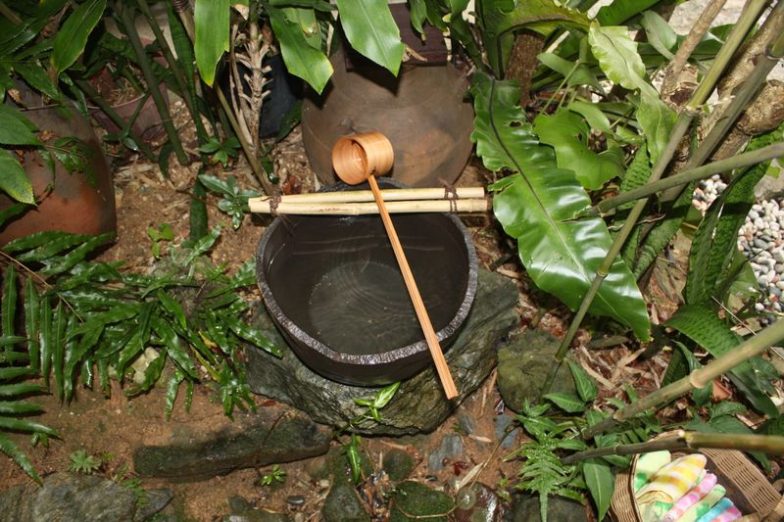CONTRIBUTED BY MARY RICHARDSON
In Okinawa, we are fortunate to be able to attend a traditional tea ceremony as practiced in Kyoto, the cultural center of Japan. I recently witnessed one as part of my personal”Month of New Challenges”.
The Tea Ceremony as we know it today originated during between 1336-1573 for samurai warriors and has been passed down through the generations. Today, both women and men administer and participate in them for special occasions, holidays, and weddings.
Picture of koicha, thick powdered tea with hot water
The tea ceremony I attended was in a lovely private home in Naha, and it was such an interesting and enjoyable experience.
It started off with a ritual of changing into wooden shoes and walking a stone path to an outdoor water source, where we each washed our hands and mouths.
From there, we passed through a small door into the tea chamber. The miniature size of the door represents each person’s equality.
Inside the room, we sat in a circle as the sensei explained the symbolism behind certain aspects of the ceremony and we watched the prescribed way of making the tea.
I have to say I was mesmerized by her beautiful hand gestures as she measured the tea, folded the tea towel just so, and poured the water. It’s not surprising to me at all that it takes years of study to become an official sensei.
We were served two kinds of tea, koicha (thick) and usucha (thin) and given small treats made out of bean paste.
A few of us left ours on the plate after a bite or two, and the sensei jokingly commented, “Japanese sweets must be an acquired taste.” In my case, that’s definitely true! I was glad there was no pressure to finish either the tea or the sweets.
Bean paste treat made to resemble a sweet river fish
After the formality of the ceremony, we were free to ask questions, closely observe the tea utensils, and take photographs.
In case you were wondering—no, you do not have to sit in the traditional kneeling position the whole time!
There were a few other really interesting aspects of the ceremony, but I won’t give it all away. You’ll have to go experience it for yourself!
This tour is available through Tours+ on Foster. The cost was $15 to reserve plus a 1500 yen tip. Children are also welcome and pay a reduced price. We had several children on our tour including a newborn baby.
Have you ever attended a tea ceremony here or on mainland? How was your experience?

